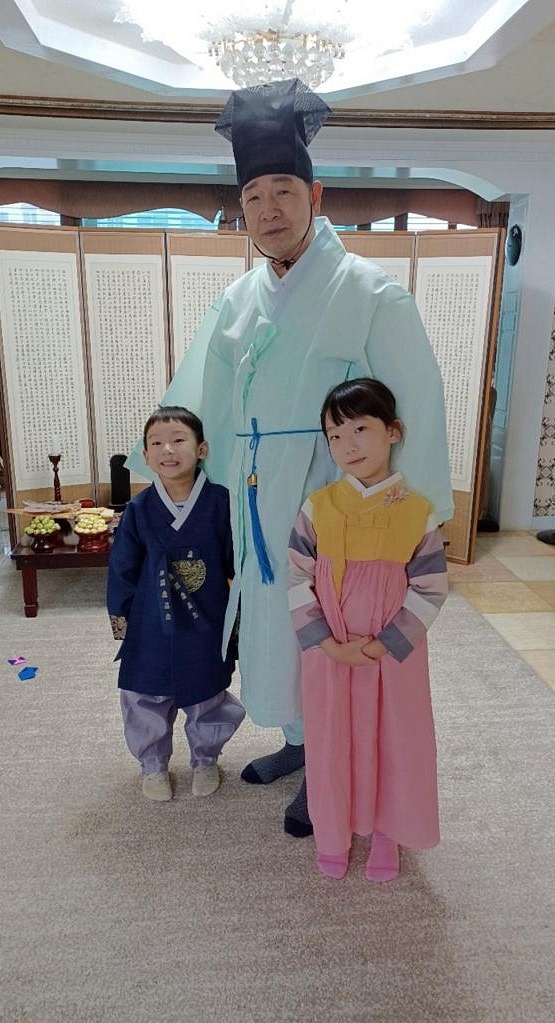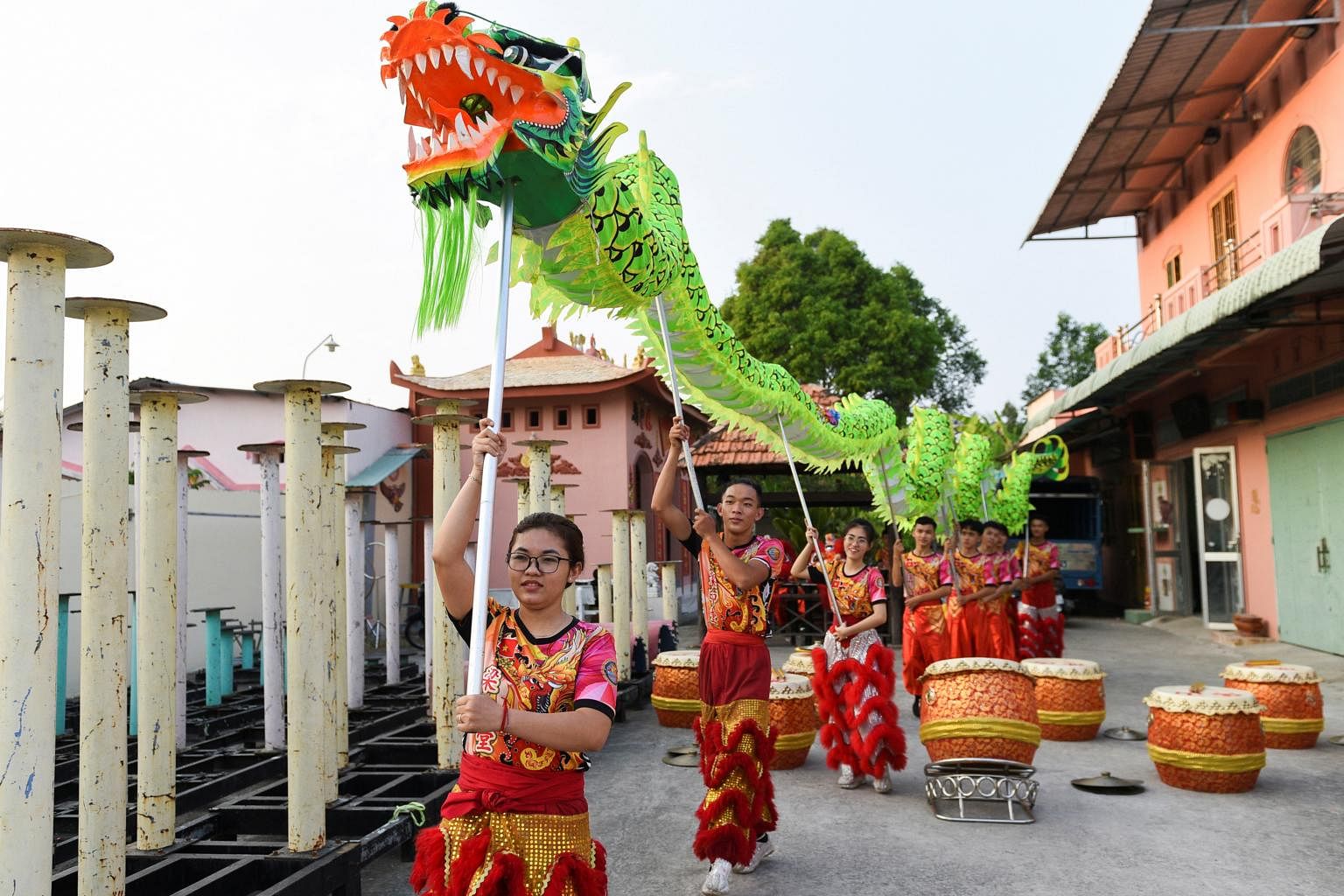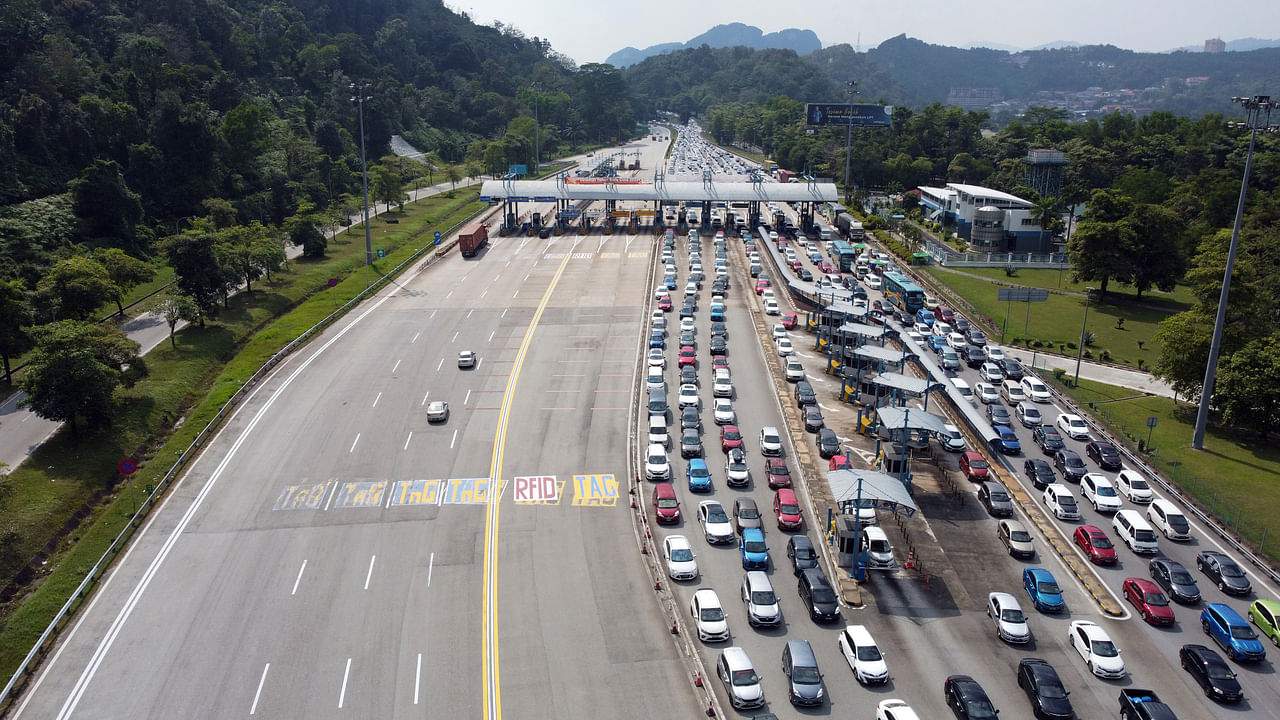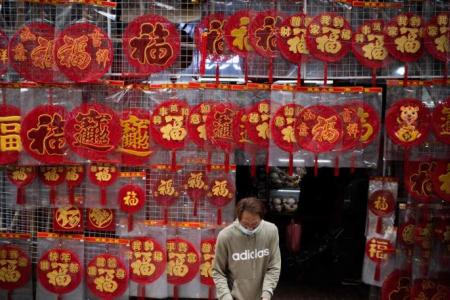Muted festive celebrations across Asia amid fears of Omicron
SEOUL - With fears of the highly infectious Omicron variant spreading rapidly, the authorities across Asia have urged people against travelling over the festive holidays to reunite with their families and celebrate the start of a new year.
Festive events, such as fairs and fireworks, have also been cancelled to prevent mass gatherings that could become hotbeds for infections, leaving those who gather to celebrate in muted fashion.
In China, where Chun Jie or Spring Festival is the most important festive season, the authorities are scrambling to prevent any surge in infections that could jeopardise the Beijing Winter Olympics starting on Friday (Feb 4).
Despite a strict Covid-zero policy, China had 2,127 active cases of the coronavirus as at Saturday (Jan 29).
Local governments have resorted to a carrot-and-stick approach to make residents stay put, with some provinces handing out incentives such as shopping vouchers, tickets to attractions and even cash.
Others have mandated either centralised or home quarantine of up to 14 days for those returning home for the Chinese New Year.
State-owned enterprises and schools have also discouraged their employees from travelling.
The biggest migration in the country happens during the few weeks before and over the new year break, when millions travel home or take a holiday.
Despite the restrictions, the Ministry of Transport still expects the Chinese to clock 1.18 billion trips during this period, a nearly 40 per cent rise from last year, but still significantly lower than the three billion trips made pre-pandemic in 2019.
Flare-ups have occurred in various parts of China, including central city Xi'an, even as the authorities try to stamp them out with mass testing, lockdowns and quarantines.
Madam Liu Shun, 56, a domestic worker in Beijing, has decided to forgo her annual trip home to Lanzhou in Guizhou province, as she is uncertain if she will be able to return to Beijing should there be an outbreak in her home city.
"It's the first time I haven't gone home during Chun Jie, but it just seems so difficult with Covid-19 tests at both ends, quarantine and the possibility of being stuck," she said. "I'll have to make do with a video call."

Hong Kong has cancelled annual Chinese New Year fairs, shut schools early, and placed multiple areas under lockdown for testing.
While the city succeeded in keeping the virus under control for much of 2021, with many months of not having a single infection, there have been over 600 locally transmitted cases in January so far, compared with just two in December.
Measures to curb the spread of the virus include a ban on dining in from 6pm and closures of venues like beauty parlours, gyms, cinemas and bars.

Travellers to Hong Kong will also have to serve seven days of quarantine, but that did not stop the parents of Mr Eric Zheng from flying in from Shanghai to spend the new year with him, as well as visit their newborn granddaughter.
"Last year it was just me and my wife, but this year my parents are here and we added a new family member, so I'm very happy that the family is reunited," said Mr Zheng, 31, a financial marketing officer.
Although the family is unable to dine out given the 6pm ban, he said it is not a problem as his parents love to cook.
"We will whip up 10 festive dishes including Longjing prawns and Nanking salted duck," said Mr Zheng. "We also plan to head to Tai O (island) to relax."
Still, he said it was a shame that the flower markets, cruises to nowhere and other big events have been cancelled as his family would have enjoyed them.
Also undeterred is South Korean public relations manager Phil Lee.
For the second year in a row, he went back to his home town alone to celebrate Seollal - South Korea's Lunar New Year - with his parents.
His wife and two children aged six and eight are staying home due to worries about infection, as the number of daily cases more than doubled in the past week, hitting an all-time high of 17,532 cases on Sunday (Jan 30).

"My wife is afraid of Omicron, so she decided to stay at home with the kids," said Mr Lee, 40. "I'm also worried, so I will do a self-test before and after my trip."
He drove on Sunday from his home in Hanam city, west of Seoul, to his parents' house in Okcheon county in central North Chungcheong province. He will return on Wednesday - the last day of the long weekend.
"My parents are a little sad because they cannot see their grandchildren, and the kids are also sad they cannot see their grandparents," he said. "But we will definitely have a video call so the kids can perform sebae to their grandparents and receive sebae ton, which I will pass to them later."
Sebae is the new year tradition of kneeling on the floor and bowing to elders, who will give sebae ton or money in return.

Mr Lee is one of 28.77 million people - out of a 51.3 million population - expected to be on the congested roads this Seollal, according to the Korea Transport Institute.
This marks a 17.4 percentage point increase from last year, expectedly so because most people are fully vaccinated and driving is deemed to be the safest transport option if they want to travel.
Southern holiday island Jeju expects to welcome some 207,000 visitors over the long weekend, up 35.2 per cent from a year ago.
Many popular hotels and ski resorts in the scenic eastern province of Gangwan are also fully booked.
This is despite numerous government appeals for people not to travel, fearing that gatherings will hasten the spread of the virus.
Prime Minister Kim Boo-kyum said on Jan 24 that going back to home towns is "no different from pouring fuel on a burning fire".
Current virus curbs in South Korea include a ban on more than six people gathering and a 9pm curfew for businesses such as restaurants and cafes.
Also fearing a Covid-19 flare-up, Manila has banned dragon dance shows, fireworks and large gatherings at the centuries-old Chinese enclave of Binondo, home to many of the 1.35 million ethnic Chinese living in the Philippines.

The country is coming off its worst outbreak of the coronavirus, fuelled by Omicron. New cases in Metro Manila, comprising 16 cities around the capital, have plunged from 18,000 on Jan 10 to less than 3,000.
Announcing the cancellation of all new year activities in Binondo, Manila Mayor Isko Moreno urged officials to enforce the rules and the public to comply with them.
"This is for the safety of all," he said.
Annual fireworks in Hanoi to celebrate Tet, the Vietnamese new year, have also been cancelled to lower the transmission risk from large crowds.
But after four waves of infections and over 90 per cent of adults vaccinated, the government is finally making it easier for people to spend Tet with their loved ones.
Travel restrictions have been minimised, allowing hundreds of thousands of people to return to their home towns over the holidays.
The government has even urged provinces and cities not to quarantine people returning to their home towns for Tet, after it emerged in media reports that the authorities in Thieu Phu Commune, in the northern province of Thanh Hoa, had locked around 30 houses for hosting people who returned from high-risk areas.

Workers from the province are reportedly leaving for their home towns earlier in order to self-isolate before Tet.
In Malaysia, open houses during the festive period are still barred but reunion dinners are allowed.
Hence, about 4.6 million vehicles crossed Malaysia's highways on Saturday (Jan 29).

But with Covid-19 cases rising to breach 5,000 for three days straight, some temples are imposing their own rules.
According to the Malay Mail, Sin Sze Si Ya Temple will cap the number of visitors to 20 at any given time.
Some devotees, however, are taking extra precautions by offering their prayers earlier in a bid to avoid crowds
"The devotees are clever. That helps us to reduce the flow of visitors to the temple next week," caretaker Ranjit Kaur said.
- Additional reporting by Claire Huang in Hong Kong, Tan Dawn Wei in Beijing, Raul Dancel in Manila, Shannon Teoh in Kuala Lumpur and Tan Hui Yee in Bangkok
Get The New Paper on your phone with the free TNP app. Download from the Apple App Store or Google Play Store now


